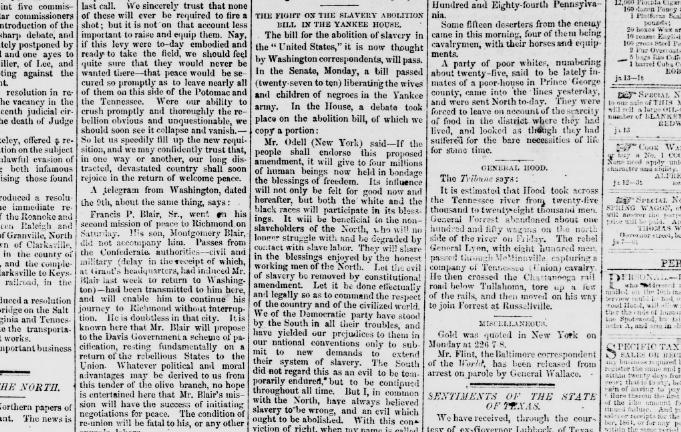|
Moderated by NW Okie! |
Volume 14 , Issue 512012Weekly eZine: (366 subscribers)Subscribe | Unsubscribe Using Desktop... |
1865 - The Fight On The Slavery Abolition Bill

We look back to Friday, 13 January 1865, page 2 of the Daily Dispatch, out of Richmond, Virginia, for information on the U.S. House fight on the Slavery abolition bill in the Yankee House. The bill for the abolition of slavery in the United States, was thought by Washington correspondents, that it would pass. In the Senate, Monday (9 January 1865), a bill passed 27 to 10 liberating the wives and children of negroes in the Yankee army. In the House, a debate took place on the abolition bill, of which the following is a portion:
"Mr. Odell (New York) said, if the people shall endorse this proposed amendment, it will give to four millions of human beings now held in bondage the blessings of freedom. Its influence will not only be felt for good now and hereafter, but both the white and the black races will participate in its blessings. It will be beneficial to the non-slaveholders of the North, who will no longer struggle with and be degraded by contact with slave labor. They will share in the blessings enjoyed by the honest working men of the North. Let the evil of slavery be removed by constitutional amendment. Let it be done effectually and legally so as to command the respect of the country and of the civilized world.
"We of the Democratic party have stood by the South in all their troubles, and have yielded our prejudices to them in our national conventions only to submit to new demands to extend their system of slavery. The South did not regard this as an evil to be temporarily endured, but to be continued throughout all time. But I, in common with the North, have always believed slavery to be wrong, and an evil which ought to be abolished. With this conviction of right, when my name is called I shall vote in favor of the resolution. The South have absolved the North from all obligations to support its chief cornerstone, slavery.
The rebel leaders are placing negroes in the field for our destruction, and have declared their willingness to abolish slavery in order to receive the recognition of foreign powers. It were better, therefore, for us to break down the physical forces used in the rebellion. Slavery had lifted its hydra head above the country. The time has come when we as a party ought to unloose ourselves from its influence. We should turn our backs on the dark past, and our eyes on the bright future.
"Mr. Ward said it was not his intention to discuss the wrongs which had inaugurated the rebellion; that it was enough for him to know that a sacrilegious attempt had been made to break up the wisest government that human wisdom ever devised; to feel that it was his duty to join in the effort to chastise the perpetrators of the crime. If the heresy of secession were to be recognized as a canon of political faith, there would be an end to all government. He then proceeded to show if pure patriotism and the maintenance of the supremacy of the Constitution had been the rule of action with both branches of the Government, the war would have been ended long before this. He regretted that no generous and conciliatory spirit had been evinced toward the misguided people of the seceded States, but that all our legislation on the subject had been characterized by a spirit of vindictiveness and oppression unworthy of a Christian nation. He was opposed to the re-admission into the Union, wight he rights of salve property, of an State which our triumphant armies had subjected, but he was not willing to prolong the war longer than was necessary to effect its legitimate object. After denouncing the policy of certain legislators, who acted throughout that the people would only be made to do right by deceiving them, and dwelling at length upon the reasons which compelled him to vote against the proposed amendment of the Constitution, he concluded by stating that if the war should be brought to a close within a reasonable time, this great republic, with its immense resources, would spring into new life, and, under the blessed reign on peace, would ultimately shake off its burdens to repose of queen-like, among the nations of the earth.
"Mr. Mallory (Kentucky) said gentlemen might say what they goose about this joint resolution, but no one could deny that it proposed a radical change in the Government of the United States. It was not an expedient to end the rebellion and restore peace; but it was a blow aimed at the foundation of the Government of which he had so long been proud. In fact, it was to take from the States of the Union the power to regulate their own domestic institutions in their own way. He denied the power to do this even by an amendment to the Constitution. We are engaged in a war to induce the rebels to come back into the Union; and how can we expect them to return under a Constitution so essentially and radically amended. We shall be guilty of breach of faith in taking this step. He differed from the views expressed by his colleague, (Mr. Yeaman,) and contended that the adoption of the amendment would only serve to augment the difficulties surrounding us."
| View or Add Comments (0 Comments)
| Receive
updates ( subscribers) |
Unsubscribe
| © . Linda Mcgill Wagner - began © 1999 Contact Me | |
